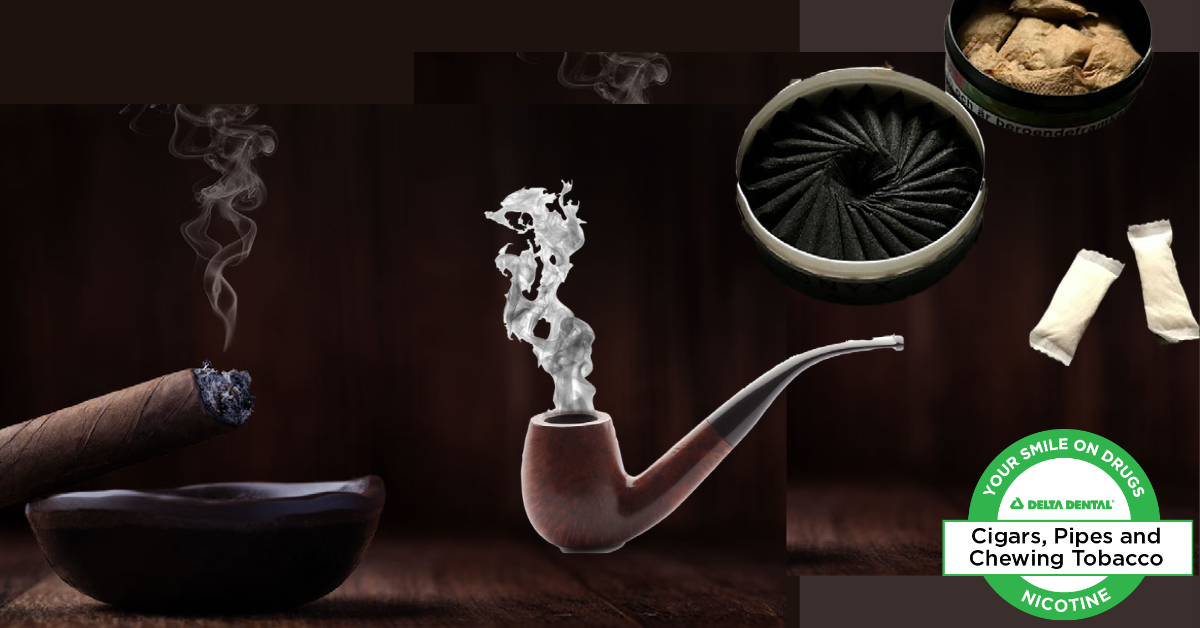The Harmful Effects of Cigar and Pipe Smoking on Your Smile
Posted Apr 2022
By Delta Dental of Arkansas
Tagged immune system, dry mouth, lost teeth, loose teeth, gum disease, oral cancer, bad breath, stained teeth, snuff, chewing tobacco, cigars, cigarettes, smoking, tobacco, nicotine
The Harmful Effects of Cigar and Pipe Smoking on Your Smile
April 2022
If you’re a cigar or pipe smoker, or if you chew tobacco, you may believe your habit is safer and healthier than cigarette smoking. Not so.
All tobacco use—inhaled, puffed, dipped, snuffed or chewed—can increase your risk of serious oral health conditions, some life-threatening.
The Oral Health Dangers of Cigars and Pipes
Cigarette, cigar and pipe smokers alike face the following oral health risks:
- yellow teeth
- bad breath
- dry mouth and subsequent danger of gum disease
- tooth decay
- weakened immune system
- increased risk of cancer.
But there is more.
Cigars contain more tobacco than cigarettes because they are bigger and wrapped in tobacco leaves, not paper. One large cigar can have as much as a pack of cigarettes. And even though cigar smoke is typically not inhaled, the toxic, addictive nicotine and other carcinogenic components are absorbed through the tissue lining the mouth to the detriment of your oral and overall health.
Pipe smokers face a heightened risk of lip cancers in the areas where the pipe stem rests.
Bottom line: If you thought puffing stogies or pipes were less harmful than smoking cigarettes, no. Simply no.
The Oral Health Dangers of Chewing Tobacco
Again, there is no escaping the oral health risks of tobacco, even if it’s dipped, chewed or snuffed:
- yellow teeth
- bad breath
- dry mouth and subsequent danger of gum disease
- tooth decay
- weakened immune system
- increased risk of cancer.
And more bad news.
- Like cigars, an average-size dip in your mouth packs more nicotine than a single cigarette. A two-can-a-week snuff dipper consumes as much nicotine as a 1-½-pack-a-day cigarette smoker.
- The sugar in spit tobacco can cause tooth decay.
- Dip and chew can cause your gums to pull away from the teeth in the area where the tobacco is held. The gums do not grow back.
- Leathery white patches, called leukoplakia, are common in dippers and chewers and can turn into cancer.
Chewing tobacco is literally chewing away your oral health.
Warning Signs to Discuss with your Dentist
Watch for these symptoms that could indicate oral cancer and discuss them with your dentist:
- Sores that last longer than 2 weeks
- Swelling, growths or lumps anywhere in or near your mouth or neck
- White or red patches in your mouth or on your lips
- Repeated bleeding from the mouth or throat
- Difficulty swallowing or persistent hoarseness
Is Vaping Dangerous for Your Oral Health?
Excellent question. If you think it’s safer and healthier than smoking a cigarette or cigar or chewing tobacco, you are sadly mistaken. More about here.
Can Your Dentist Tell You’re Using Tobacco?
If you’re trying to hide your tobacco use, you probably won’t fool your dentist. They can smell the nicotine on you, notice the yellowing teeth, spot the dry mouth and diagnose the early (or advanced, depending on your last visit) stages of tooth decay and gum disease. They will also be able to detect sores, unusual white or red blotches and lumps and swellings.
When asked about any of this, you’ll want to come clean. In fact, your dentist may be your strongest ally if you want to kick your nicotine habit. They can advise you on the changes you can make to maintain or improve your oral health and recommend resources to help you quit smoking.
Smile: Dental Insurance Can be Good for You
We’re not blowing smoke when listing the advantages of dental and vision insurance with Delta Dental of Arkansas:
- Individual, family and group coverage
- Different plans with different benefit levels to suit different needs
- Access to Arkansas’s largest networks of providers
- Competitive rates
Check us out.
 |
 |

